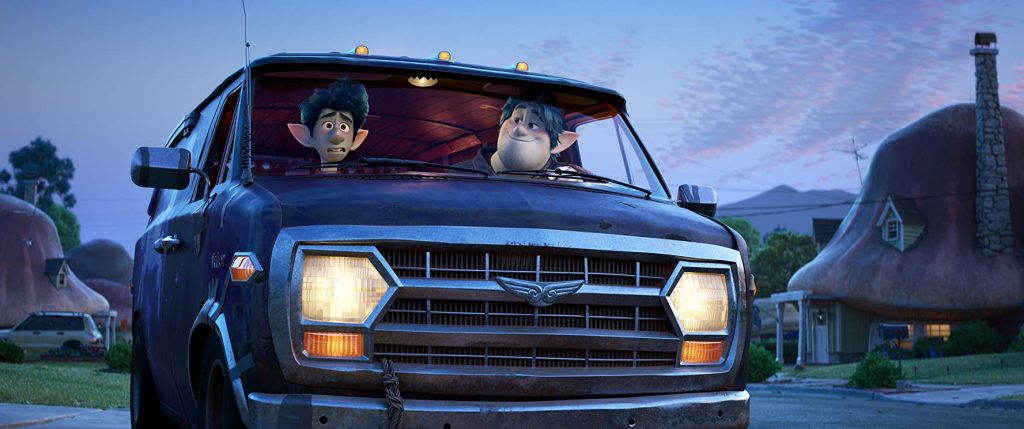June 29, 2024
by Carla Hay

Directed by Daina O. Pusić
Culture Representation: Taking place in an unnamed city in England, the dramatic film “Tuesday” features a predominantly white cast of characters (with a few black people) representing the working-class and middle-class.
Culture Clash: A 15-year-old girl (who has an unnamed terminal illness) and her worried mother have interactions with death, which manifests itself as a talking macaw that can willingly change the size of its body.
Culture Audience: “Tuesday” will appeal primarily to people who are fans of star Julia Louis-Dreyfus and offbeat movies about confronting mortality.

The morbid drama “Tuesday” is best appreciated by viewers who can tolerate surrealistic movies about death. It’s a unique story about a mother and daughter interacting with death, which is embodied as a talking macaw. The concept is creative but alienating. The people who will dislike this movie will really hate it, while others will either like or love this movie. It’s a flawed but interesting film. The cast members’ performances might keep viewer interest if people still want to watch the movie after seeing how death is portrayed in the story.
“Tuesday” is the feature-film directorial debut of writer/director Daina O. Pusić, also known as Daina Oniunas-Pusić. The movie had its world premiere at the 2023 Telluride Film Festival and then made the rounds at other film festivals, such as the 2023 BFI London Film Festival and the 2024 Miami Film Festival. Before writing and directing “Tuesday,” Pusić wrote and directed short films.
The opening sequence in “Tuesday” shows Death (an orange macaw) taking the lives of several people in various locations. (“Tuesday” takes place in an unnamed city in England, where the movie was filmed on location.) Death can change its size by choice. In the movie, Death’s sizes range from being as small as a thimble to as large as a tall building. The character of Death is a combination of computer-generated imagery and visual effects for a live actor performance. In the scenes where Death is human-sized or larger, Death is portrayed by actor Arinzé Kene.
Death has a deep, gravelly voice that can be off-putting to some viewers. When Death is ready to take someone’s life, Death gives that someone a very tight embrace. Some of the dying people welcome death, while others don’t want death anywhere near them. Some are shocked and frightened by seeing Death, while others are not surprised and are much more accepting.
These contrasting attitudes toward Death can be seen in the mother and daughter who are the people at the center of the story. Zora (played by Julia Louis-Dreyfus) is an American single mother, who lives with her 15-year-old daughter Tuesday (played by Lola Petticrew), who has an unnamed terminal illness. Tuesday’s father is not seen or mentioned in the movie. It’s also never explained why Zora is living in England, but it can be presumed she’s lived in England for several years because Tuesday has an English accent.
Tuesday uses an oxygen tank and a wheelchair. She also has a compassionate home care nurse named Billie (played by Leah Harvey), who visits the household on a regular basis. An early scene in the movie takes place in a taxidermy shop, where Zora is selling some unusual taxidermy figures: rats dressed as Catholic bishops. Zora says these items are her daughter’s but Zora is selling them without her daughter’s knowledge. It’s later revealed that Zora has been secretly selling things in the household because she lost her job and doesn’t want to tell Tuesday.
Tuesday is the first person in the household to see Death. Instead of being alarmed, Tuesday tells Death a story. Death laughs and shrinks to the size of a thimble. It’s the beginning of an unusual acquaintance that develops between Tuesday and Death. Tuesday is lonely (at one point, she mentions later that her friends abandoned her because of her illness), so she enjoys talking to Death.
When it comes to Tuesday’s terminal illness, Zora is much less accepting of it than Tuesday. Whereas Tuesday seems to be quietly peparing to die, Zora is angrily defiant and doesn’t want to consider that Tuesday is running out of time to be alive. The movie does not mention how long Tuesday has had this terminal illness or the medical diagnosis for Tuesday’s life expectancy. Zora believes that she and Tuesday can successfully fight this disease together.
Needless to say, Zora’s first encounters with Death are very hostile. It leads to some disturbing scenes where Zora tries to get rid of Death. (Sensitive viewers, be warned: These scenes show some animal cruelty.) And then, Zora does something truly bizarre that will either further alienate viewers of this movie or will make viewers curious to see what will result from Zora’s extreme actions.
“Tuesday” might have been better as a short film, since much of the movie gets repetitive, with pacing that drags. The movie’s marketing is somewhat misleading because Zora is not in the film as much as the movie’s trailer and poster suggests. There’s a huge chunk of the movie where Zora is not seen at all. Most of the conversations that Death has are with Tuesday.
Billie is an underdeveloped character. Don’t expect to learn much about her or anyone else in the movie who isn’t Zora, Tuesday or Death. Billie is the supporting character who gets the most screen time. All the other supporting characters pass through the story in cameo roles.
“Tuesday” has flashes of droll comedy, but the movie’s overall tone is gloomy and weird. Tuesday is an intelligent teenager who’s a little eccentric. Her personality is at the heart of the film. There are times that Tuesday wants to die, which is very unsettling to Zora, who says out loud that it’s unnatural for a parent to outlive a child.
“Tuesday” takes a bold risk of not following the usual movie stereotype of making Zora a saintly mother of an ailing child. Zora is often impatient and rude. As the story goes on, it becomes clearer that Zora’s bad attitude has a lot to do with being under financial pressure to take care of Tuesday while Zora is unemployed and dreading a future without Tuesday.
What saves “Tuesday” from being too abstract and too enamored with its fantastical elements is the fact that the film’s story is grounded in an authentic depiction of a mother-daughter relationship. The movie is a unique portrayal of stages of grief when it comes to death. “Tuesday” is memorable for its talking bird, but what will stay with viewers the most is what the movie has to say about humanity.
A24 released “Tuesday” in select U.S. cinemas on June 7, 2024, with an expansion to more U.S. cinemas on July 14, 2024.











